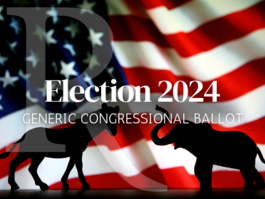What They Told Us: Reviewing Last Week’s Key Polls - Week Ending October 6, 2018
Maybe it’s because he’s out of the headlines, but President Trump is enjoying his highest job approval rating since just after his inauguration last year. For U.S. Supreme Court nominee Brett Kavanaugh, it’s still a battle.
At week’s end, 51% of voters approve of the job the president is doing in the Rasmussen Reports daily Presidential Tracking Poll. Trump’s monthly approval held steady at 47% in September.
Now that Gallup has quit the field, Rasmussen Reports is the only nationally recognized public opinion firm that still tracks President Trump's job approval ratings on a daily basis. If your organization is interested in a weekly or longer sponsorship of Rasmussen Reports' Daily Presidential Tracking Poll, please send e-mail to [email protected].
The president announced early in the week the completion of a new trade agreement with Canada and Mexico to replace the much-maligned North American Free Trade Agreement (NAFTA) that dates from the 1990s. Voters have long been suspicious of free trade deals and expected Trump to negotiate a better NAFTA.
Responding to the drumbeat of support by Democrats for the still unproven sexual assault allegations against Kavanaugh, the president said earlier this week, “It’s a very scary time for young men in America when you can be found guilty of something that you may not be guilty of.” Most voters agree.
Fifty-six percent (56%) of voters say that when a public figure is accused of sexual wrongdoing, the media will regard him as guilty until proven innocent. A plurality (47%) thinks when most reporters write or talk about Kavanaugh, they are trying to defeat his confirmation.
Following Christine Ford’s recent appearance before a Senate committee, voters are slightly more likely to believe her allegations of sexual assault against Kavanaugh, but most voters still think the Supreme Court nominee’s Senate confirmation is likely.
An angry Kavanaugh at the same hearing denied multiple allegations of sexual assault when he was in high school and said: “This confirmation process has become a national disgrace. The Constitution gives the Senate an important role in the confirmation process, but you have replaced advise and consent with search and destroy.” Most voters think he's right. Even Democrats are conflicted.
After that hearing, the FBI was asked to look into the sexual assault allegations against Kavanaugh. But even before the FBI report was finished this week, voters were saying its findings wouldn't satisfy anyone.
But then most voters disapprove of how the U.S. Senate has conducted Kavanaugh's confirmation process and say the Supreme Court nominee has been investigated enough.
Given the emotions surrounding the Kavanaugh nomination, it’s no surprise that 65% of voters think there is a greater danger of political violence now compared to past years.
Democrats are trying to derail Kavanaugh, hoping that if they win control of the Senate in November they can force the president to pick a more liberal candidate for the Supreme Court. But most voters continue to believe that Trump cannot possibly pick a candidate for the court who will be acceptable to senators in both political parties.
Democrats still hold a small lead on the Rasmussen Reports Generic Congressional Ballot. We’ll be looking to see if future numbers reflect any changes because of the Kavanaugh controversy.
Rasmussen Reports invites you to be a part of our first-ever Citizen-Sourced National Midterm Election Polling Project. Learn more about how you can contribute.
Two-out-of-three voters (67%) still think Americans should be required to show photo identification before being allowed to vote.
In the upcoming midterm elections, West Virginia will be the first state to allow voters to cast their ballots using their mobile phones, but most voters, fearful of voting fraud, don't want their state to follow suit.
Only 19% think it’s too hard to vote in America today.
In other surveys:
-- Forty percent (40%) say the country is heading in the right direction.
-- Americans agree that social media sites need to do a better job of separating fact from opinion in their feeds but have very little confidence that they'll do it fairly.
-- Fifty percent (50%) of voters think social media like Facebook and Twitter have had a bad impact on politics in America.
-- October is Breast Cancer Awareness Month, and more than a quarter of Americans have lost someone close to breast cancer.
-- Seventy-nine percent (79%) rate their personal health as good or excellent, but many continue to pass on medical checkups and prescription drugs to save money.
Visit the Rasmussen Reports home page for the latest current polling coverage of events in the news. The page is updated several times each day.
Remember, if it's in the news, it's in our polls.
Rasmussen Reports is a media company specializing in the collection, publication and distribution of public opinion information.
We conduct public opinion polls on a variety of topics to inform our audience on events in the news and other topics of interest. To ensure editorial control and independence, we pay for the polls ourselves and generate revenue through the sale of subscriptions, sponsorships, and advertising. Nightly polling on politics, business and lifestyle topics provides the content to update the Rasmussen Reports web site many times each day. If it's in the news, it's in our polls. Additionally, the data drives a daily update newsletter and various media outlets across the country.
Some information, including the Rasmussen Reports daily Presidential Tracking Poll and commentaries are available for free to the general public. Subscriptions are available for $4.95 a month or 34.95 a year that provide subscribers with exclusive access to more than 20 stories per week on upcoming elections, consumer confidence, and issues that affect us all. For those who are really into the numbers, Platinum Members can review demographic crosstabs and a full history of our data.
To learn more about our methodology, click here.



